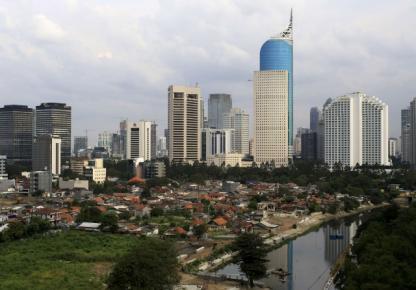Foreign investors unhappy with some of Indonesia's new inves
Bareksa • 14 May 2014

An aerial view of the business district in Jakarta (REUTERS/Beawiharta)
For the first time, Indonesia has restricted foreign ownership of warehousing and cold storage
Bareksa.com - Indonesia's new foreign-investment rules, rather than attract new investors, could deter them from entering energy, agriculture, retail, storage and other sectors, business lobby groups and some company executives say.
Last August, at a time when the rupiah was tumbling and there were serious concerns about Indonesia's economy, the government announced that it would change investment rules in a bid to attract more foreigners.
It took nearly nine months for the government's revisions of what's called the "negative investment list" - which lists restricted sectors - to be published. Since the Investment Coordinating Board published the changes last week, the response has largely been negative.
"On balance, the revised negative investment list is a cold shower for investors," said Andrew White, managing director of American Chamber of Commerce in Indonesia.
An executive of another foreign chamber said it also opposed the new changes, though he expressed doubt engaging officials about them could help as the government of President Susilo Bambang Yudhoyono will be out of office in October.
Indonesians will vote for a new president on July 9.
Yudhoyono, who cannot seek a third five-year term, said the revisions to the decades-old negative investment list would attract overseas investors, as it opened up pharmaceuticals and advertising to more foreign involvement.
But the 104-page document also introduced limits for new foreign investment in oil services, storage, retail trade, horticulture and small power plants.
"For new players who want to come in to Indonesia and set up a brand new venture, it makes things a little bit more complicated," said an official at a major commodities firm who was not authorized to speak to the media.
For the first time, Indonesia has restricted foreign ownership of warehousing and cold storage, limiting investment to 33 percent. The move could hinder expansion by agriculture importers or traders with an existing Indonesian footprint, such as U.S. giant Cargill, Singapore's Olam International and global commodities trader Louis Dreyfus .
"This ownership limitation means that to invest in the sector, all foreign companies have to partner or collaborate with local investors," Jimmy Bella, a domestic trade official at the Trade Ministry said about the distribution and warehouse sectors.
Nationalism a factor
The government also barred new foreign investment in retail stores that sell electronics, footwear, textiles, toys and food, potentially making it difficult for firms planning to expand into Indonesia, such as IKEA.
Government officials and domestic industry groups back the new foreign investment limits, saying they are necessary to allow Indonesian companies to better compete in their own country.
"It is important to look at the perspective of sustainability, growth and participation of the Indonesian people," Mahendra Siregar, chief of Indonesia's Investment Coordinating Board, told Reuters.
The next president, who will take office in October, will need to balance increasing nationalistic policies with the country's dependence on foreign investment to help fund the current-account deficit.
Foreign investment growth in the first quarter slowed to its lowest level in nearly five years, while the current-account deficit was 2.06 percent of gross domestic product.
(Source : Reuters)